Editor’s Note: Sign up to get this weekly column as a newsletter. We’re looking back at the strongest, smartest opinion takes of the week from CNN and other outlets.
In the early morning hours of August 2, 1990, columns of Iraqi tanks crossed the border into Kuwait, taking over the smaller nation. The world’s response to Saddam Hussein’s surprise assault on a sovereign country was swift and ultimately devastating.
A coalition led by the US, with the support of the United Nations Security Council, attacked Iraq and restored Kuwait’s independence. But the consequences of the unprovoked war didn’t end there: For three decades, Iraq was required to compensate the Kuwaiti victims of Saddam’s invasion. Just this past Tuesday, the Security Council voted unanimously to confirm that Iraq had fulfilled its obligation after it paid out $52 billion.
It’s an accident of timing that within two days Russian President Vladimir Putin would announce that he had launched a war against neighboring Ukraine. He called it a “special military operation,” but it was in reality an unprovoked invasion. Democracies around the world condemned it. But this is not 1990, Ukraine is not Kuwait and most importantly, Putin is not Saddam.
After all, the Russian president presides over a huge arsenal of nuclear weapons. He promised “such consequences that you have never experienced in your history” to anyone who “tries to interfere with us…”
While NATO countries are strengthening defenses on the alliance’s eastern flank and the West is imposing severe sanctions, none are intervening directly in Ukraine’s defense. So the key question is: What, if any, is the long-term price Putin will pay? One outcome thus far: nearly worldwide condemnation of Russia for its president’s attack on Ukraine and a wave of sympathy for the people of Ukraine.
“The threat from a nuclear-armed dictator defying the international community and sending a massive military machine to crush its neighbor in the 21st century cannot be overestimated,” wrote Frida Ghitis. “The international community, led by the US, cannot be intimidated by a Russian tyrant who throws his critics in prison and invades his neighbors.”
Russian officials had repeatedly denied US assertions that it was preparing to invade Ukraine. But “in the end, Putin did exactly what President Biden told the world he would do: He launched an invasion of Ukraine on a runway of lies,” Ghitis noted.
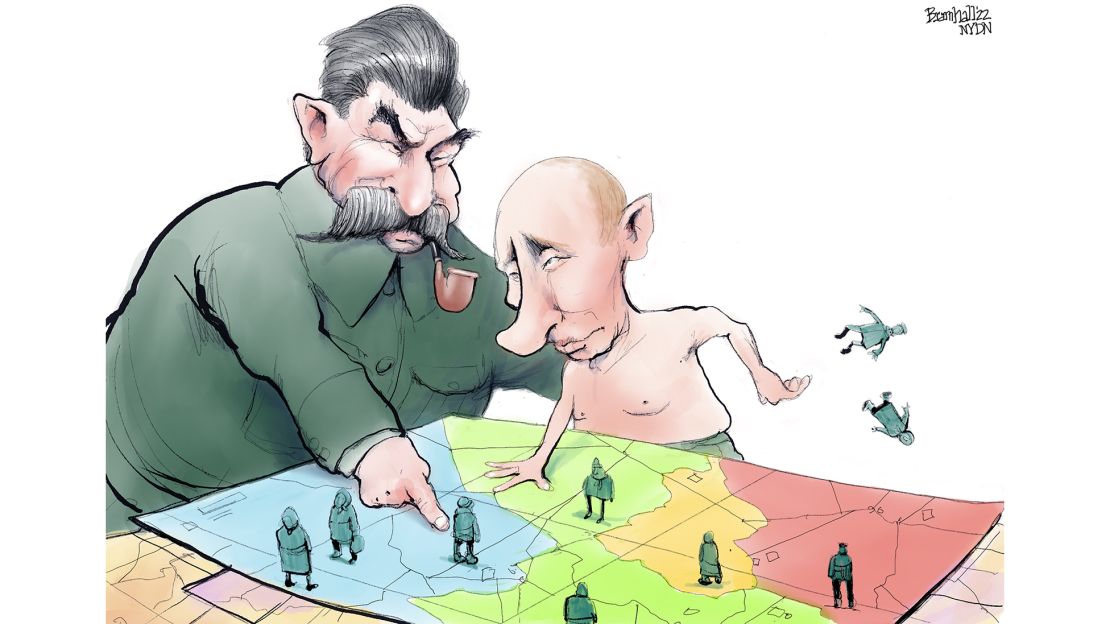
“The challenge for the West could not be clearer,” wrote Russia scholar Daniel Treisman. “If Putin succeeds in undermining Ukraine, he is unlikely to stop there. His distrust of the West and expansive view of Russia’s destiny are by now deeply entrenched. Our policy must raise the cost of eroding the international order.”
At a 2015 reception, Treisman “asked Putin about his planning for the occupation of Crimea. ‘I was even surprised at how well it went!’ he told me with a smile. The West must make sure he does not find it so easy this time.”
The sanctions
A UN Security Council resolution condemning the invasion was vetoed by Russia Friday, but international law expert Mary Ellen O’Connell argued that “the UN General Assembly – the body that includes all 193 member states – could activate the Uniting for Peace Resolution and meet in an Emergency Special Session to coordinate worldwide sanctions and other measures to enforce the Charter…The General Assembly can demonstrate to Russia in the current crisis how isolated it is and launch a global campaign of sanctions.” On Saturday, the US proposed such an emergency session of the General Assembly.
Do sanctions exact enough pain to stop an aggressor like Putin? Peter Bergen is skeptical: “Authoritarian regimes generally shake off even draconian sanctions at the expense of their own people. Look at Kim Jung Un’s North Korea today or Saddam Hussein’s Iraq during the 1990s; punishing US sanctions helped to immiserate the North Korean and Iraqi populations with scant consequences for their regimes.”
Such action wouldn’t likely shake Putin’s determination to dominate Ukraine, an impulse he made clear in his remarks Monday. “On the cusp of declaring portions of Ukraine as stand-alone ‘people’s republics,’ he embarked on a rambling, distorted and utterly chilling hour-long rewrite of Russian and Soviet history in a televised speech to his nation,” wrote David Andelman, who called it a “frightening insight” into Putin’s thinking that should alarm the Baltic states and other former republics of the Soviet Union.
“For the strongman, a government’s only meaningful source of legitimacy is strength,” wrote Franklin Foer in the Atlantic. “Borders are simply an expression of a nation’s might. A people’s sense of nationhood and its claims to its own history are meaningless if it is too weak to defend itself…
“If Putin is bent on provoking NATO into a wider war, will Biden join it? These are dreadful questions, where high ideals crash against terrifying realities, and they will define the Biden presidency.”
Looking at the potential downside for Biden, Julian Zelizer pointed to the damage Jimmy Carter’s presidency suffered as a result of his failure to persuade the Soviet Union to end its invasion of Afghanistan. “If this Russian assault on Ukraine continues for months and the humanitarian crisis turns out to be as bad as some expect, Biden’s inability to take stronger action could become a major liability going into the midterms and the 2024 election,” Zelizer wrote. “It will only be a matter of time before Republicans start reminding the public that a Democrat was in the White House both times Russia invaded Ukraine in the past decade.”
For more:
Carrie Cordero: Was the US gamble on releasing Ukraine intelligence worth it?
Paul Begala: A huge opportunity for an embattled Biden
Bravery in Kyiv
In Kyiv, Olesia Markovic’s husband woke her up on Thursday with news that Russia was firing shells at Ukrainian targets.
“Kyiv is facing a new reality,” Markovic wrote. “Lots of people left in the morning, causing traffic jams on exit roads from the city to the south and west. We – my husband and eight-year-old son – decided to stay. Watching the live feed of traffic on TV we figured that it would be safer to stay home. Especially given that all infrastructure in Kyiv – electricity, internet, mobile phone connection, subway – still worked just fine…”
“We have packed the necessities – folder with documents, laptops and carriers for our three pet cats in case we hear the shelling siren and have to go to the bomb shelter.” Her son got a day off from school “and doesn’t seem concerned – after all, random school closures became the norm during lockdown. He took a choco-spread sandwich and went to the living room to watch Ironman (his favorite superhero) while we remained glued to our phones and updates of war.”
Friends have offered her sanctuary in the US and many other countries, but “what is much more important now is to build a safety net for Ukraine. That means calling on the international community for help – diplomatic solutions, sanctions, pressure on Russia – anything that would make a dictator stop in his tracks.”
“In the meantime, Ukraine will stand strong. It’s not the first time in our history that we resisted a threatening empire.”
In the western Ukraine city of Lviv, Michael Bociurkiw wrote Thursday, “The streets were empty and quiet but as the first rays of daylight emerged, anxiety and fear had begun to take hold: air raid sirens blared across the fortresses, churches and quaint cobblestone streets of Ukraine’s cultural capital. A male voice instructed people to shelter in place and turn off their gas connections. People started to form long lines at bank cash machines and head to the markets while they were still open.”
“While the full-scale invasion may have shocked some Western leaders,” Bociurkiw noted, “the least surprised were the Ukrainians themselves, expressing an ‘I told you so’ attitude. Ukrainians always knew the sanctions threatened by the West were going to be too weak, and not go far enough in deterring this awful reality.”
In Russia, police locked up more than 2,000 demonstrators protesting Putin’s war. “This is not a popular war among the Russian public,” wrote Mathew Schmidt. “It’s important for Westerners to understand that ethnic Ukrainians are a large minority in Russia. Millions of Putin’s citizens have friends or relatives staring up the barrels of Russian guns.”
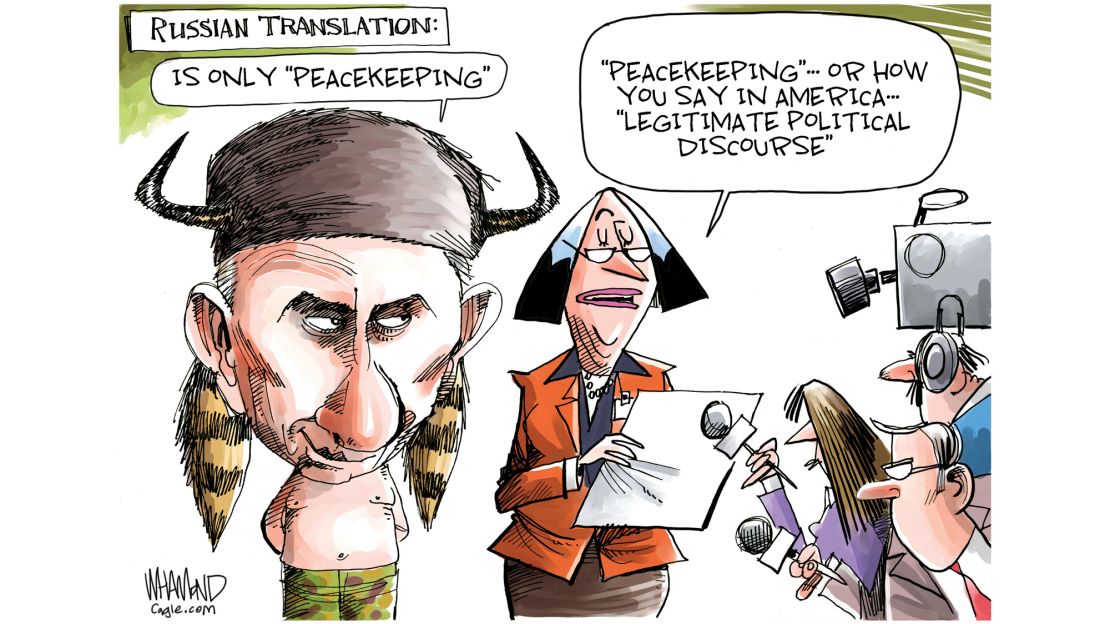
A national hero for Ukraine
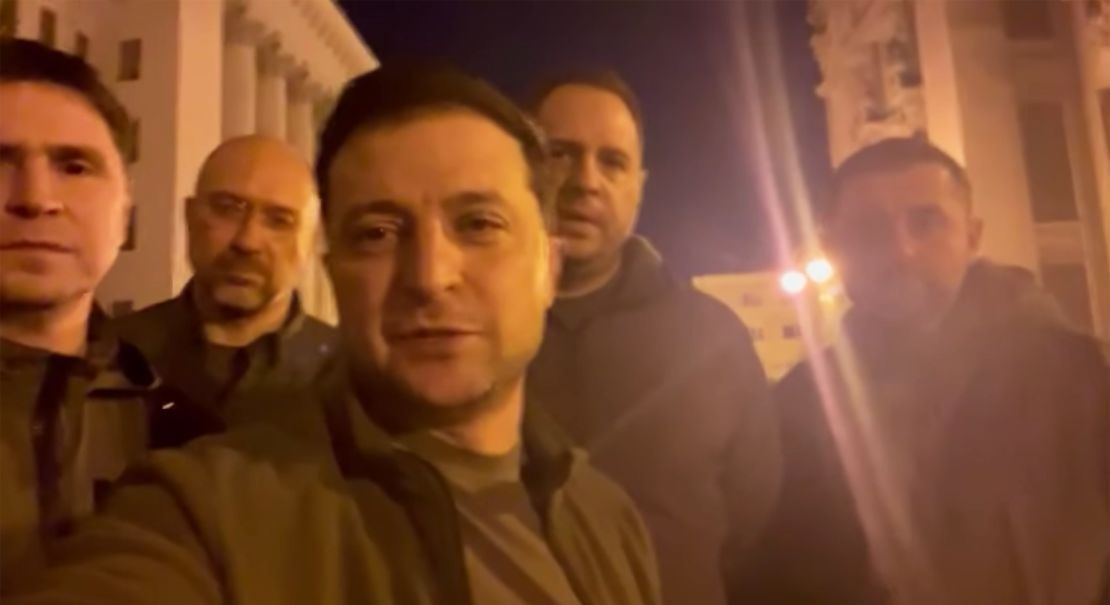
Ukrainian President Volodymyr Zelensky is a comedian-turned-politician whose popularity had declined sharply before this crisis. But, as Jay Parini wrote, “The past week has transmogrified Zelensky from a rapidly dwindling presidential figure into a national hero on a massive scale. He has shown himself to be a man who has dug into himself and found an inspiring store of courage. When the United States offered to evacuate him from Ukraine, he stood his ground, saying, ‘The fight is here; I need ammunition, not a ride.’”
“He has posted several videos online, and they’ve inspired a fierce defiance among the Ukrainian people. In one video titled ‘We are here. We are in Kyiv. We are protecting Ukraine,’ Zelensky can be seen surrounded by his top advisers. ‘We are all here. Our army are here. Citizens and society are here,’ he says. ‘We are defending our independence, our state, and it will remain so.’”
“Zelensky, a fluent Russian speaker, has also appealed to Russians in another video, urging them to ‘just stop those who lie, lie to you, lie to us, lie to everyone, to the whole world. We need to end this war. We can live in peace, in a global peace.’”
“His gifts for communication and his remarkable grasp of social media make him a formidable opponent for Putin,” Parini noted, “even though the army he commands, in sheer numbers and resources, pales beside Russia’s.”
Addressing Putin, Christian Caryl wrote in the Washington Post that “over the past few years, Ukrainians (and the rest of the world) have seen more and more clearly the crass divide between your protestations of pan-Slavic brotherhood and the cynicism and corruption of your regime. Your speeches in recent days, in which you depicted Ukrainians as citizens of a half-imaginary country whose fate should be determined by the Kremlin, will only deepen the rupture between Russians and Ukrainians…You can try to seize power through force and fear and lies — but you have already lost the war of ideas…even if you try to terrorize Ukrainians into accepting a pro-Russian leader as your proxy, that effort will not endure, either. Ukrainians have been through that before.”
For more:
Paul Hockenos: Good riddance Nord Stream 2. Now Europe has a golden opportunity.
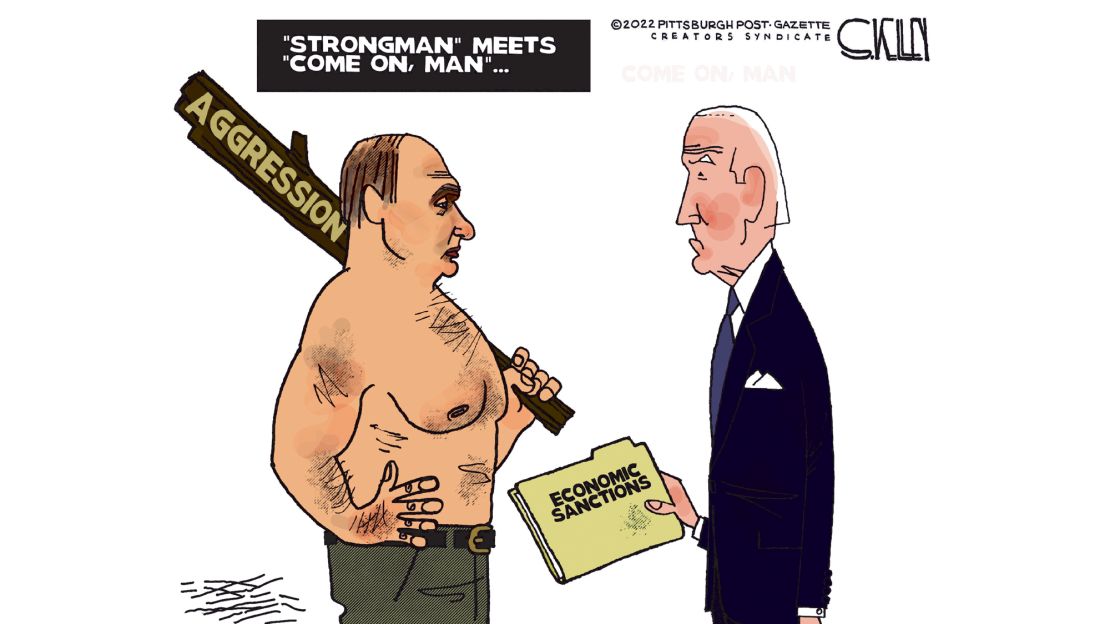
Ketanji Brown Jackson
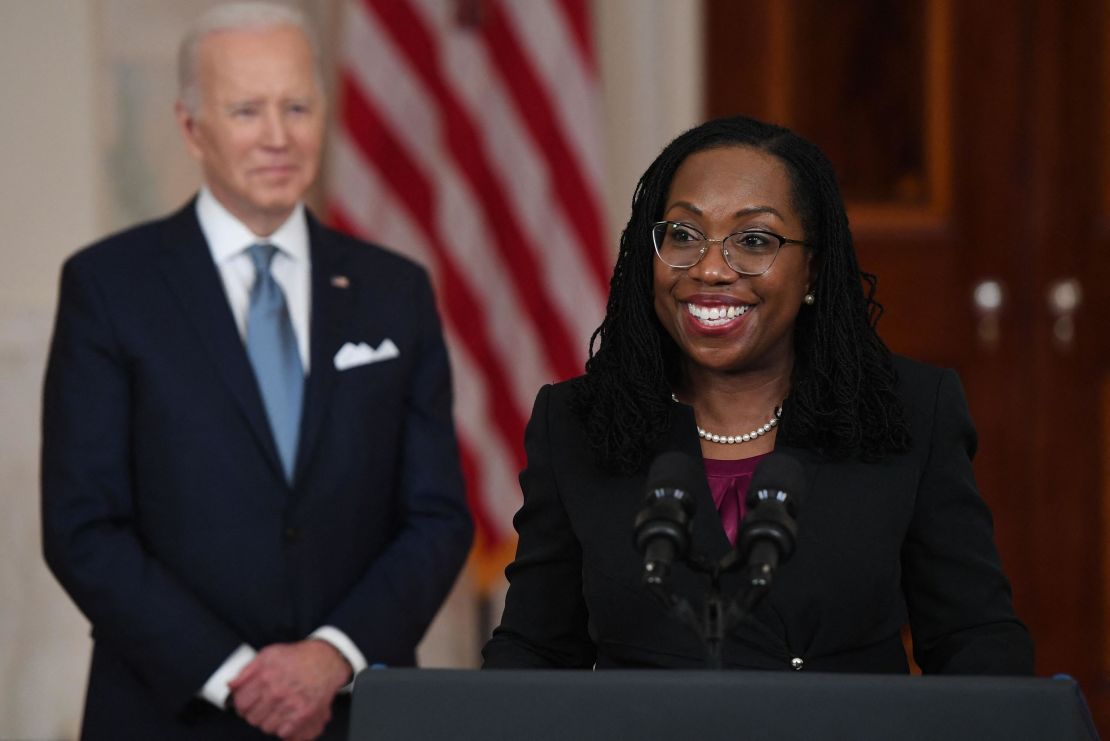
Biden announced his choice for a US Supreme Court seat Friday, introducing Judge Ketanji Brown Jackson at a White House ceremony. In concluding her remarks, Jackson pointed out that she shares a birthday with the late Constance Baker Motley, the first Black woman to serve as a federal judge. If confirmed by the Senate, Jackson will blaze a new path herself by becoming the first Black woman on the nation’s highest court.
“Her historic nomination promises an end to the erasure of Black women from our most sacred legal institutions,” wrote Fatima Goss Graves. “She brings extensive litigation experience at every level of the federal court system, including distinguished service as a federal public defender.”
“You will not find a more qualified nominee,” wrote Elie Honig. “She graduated from Harvard, both undergrad and law school. She clerked for a federal district court judge and then, in a nice bit of symmetry, nabbed a mega-prestigious clerkship with Justice Stephen Breyer, who she now stands to replace.”
Jackson “won’t change the current ideological balance of the court by replacing Breyer,” legal scholar Erwin Chemerinsky noted. “But if Jackson is still a justice in 2040 and 2050, she may be a stabilizing force on a very different court.”
To Laura Coates, it’s a plus that Jackson worked as a public defender. “The public may mistakenly view those who represent the accused as soft on crime. Indeed, if past is prologue, I expect such an absurd talking point to emerge during Jackson’s confirmation hearings. But public defenders are not soft on crime – they are hard on injustice, which is precisely where we as a society must be. And precisely where a Supreme Court justice ought to be.”
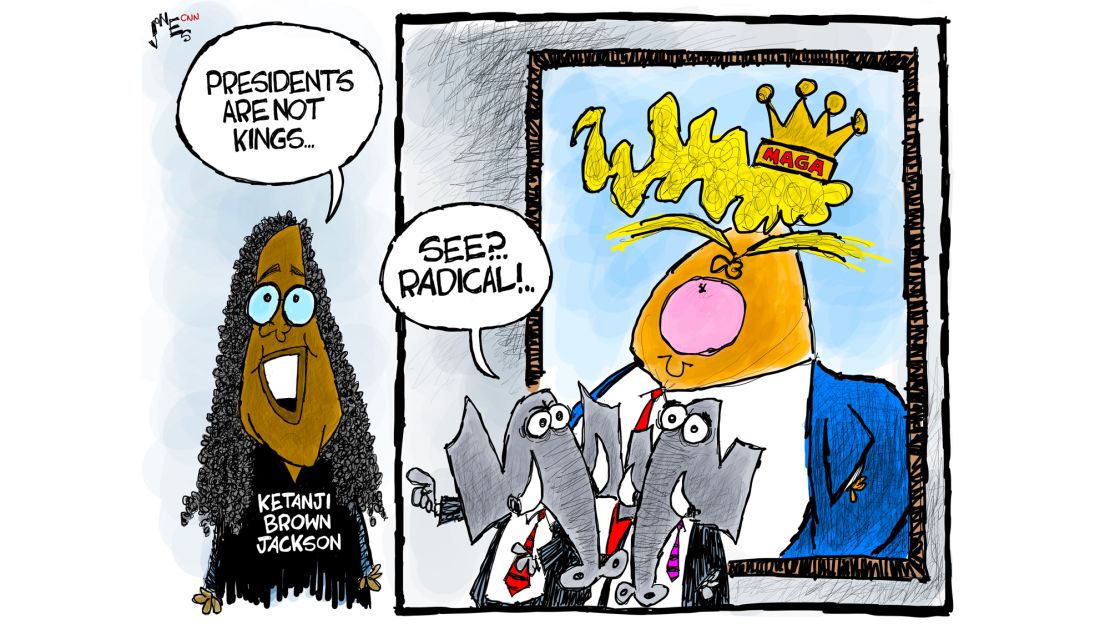
Senators should ask Jackson for “her view of the court’s role in government and its responsibility to faithfully interpret the laws as written,” wrote Adam White. “In an era when the Supreme Court is enduring partisan attacks on its legitimacy, and facing dangerous threats to pack the court for partisan purposes, it is crucial for senators – and all Americans – to know that the next justice is committed to preserving the rule of law and the court’s indispensable constitutional role.”
Jennifer Rodgers, a former federal prosecutor, observed that “Biden is right to prioritize elevating judges who bring different backgrounds and experiences to the courts, especially to the Supreme Court, where not a single justice has Jackson’s experience defending criminal cases. The Supreme Court needs more diversity, of all kinds; hopefully Jackson will be the first step in making that become a reality.”
For more on the Supreme Court:
Jill Filipovic: Enough shocking stories about Ginni Thomas. It’s time for some action
Trump’s take
Just how profoundly former President Donald Trump altered the politics of the right in America could be glimpsed last week by the way some conservatives praised Putin and made excuses for his hostility toward Ukraine. Not least was Trump himself, who referred to the Russian leader’s takeover of separatist regions in eastern Ukraine as “genius” and called Putin “very savvy.”
“It’s hard to know if the former President could have said anything more disturbing as Russia bullies a much smaller country,” wrote Michael D’Antonio. “But it’s certain that as he sided with America’s opponent, he was being true to himself.”
SE Cupp said “far-right voices in the Republican Party and in right-wing media seem hell-bent on helping the dictator with some free earned media and a ton of sycophantic praise… it seems to escape them that they are being used, they are doing Putin’s dirty work, they are just pawns, and they’re performing even better than expected.”
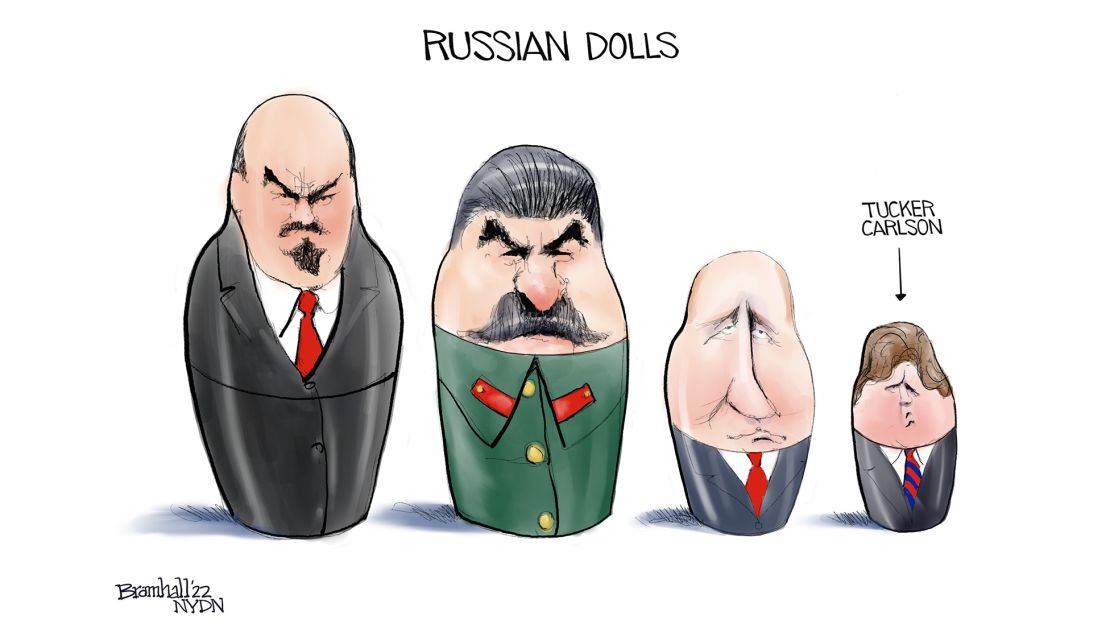
10 years after Trayvon Martin’s death
CNN legal analyst Areva Martin wrote that it wasn’t a surprise that jurors quickly found the three men who shot and killed Ahmaud Arbery in Georgia guilty of federal hate crimes.
“The prosecution called 21 witnesses, with many testifying about horrific and offensive racist slurs and rants by the defendants – hatred aimed specifically at Black people,” Martin noted. “The language that witnesses attributed to all three men was so disturbing as to cause a juror to ask about counseling and to send one witness off the stand in tears.”
“The case speaks to bigger issues about an entire swath of our country that has been inculcated with theories of White supremacy and superiority – and Black inferiority. These theories and messages play out regularly on television, in communities like the one at issue in this case, and in the media. They reinforce anti-Black sentiment that will only worsen as state legislators introduce bills seeking to restrict schools from teaching Black history and the fullness of American history, and as school committee members and rogue parents fight to ban books that present the truth about our past and present.”
As Black History Month nears its end, Peniel E. Joseph noted this weekend’s 10-year anniversary of the killing of Trayvon Martin and the convictions Thursday of the three former Minneapolis police officers for depriving George Floyd of his civil rights by showing deliberate indifference to his medical needs as another officer, Derek Chauvin, kept his knee on Floyd’s neck for more than 9 minutes and killed him.
“Trayvon Martin died in a country that would re-elect Barack Obama but proved unable to hold anyone accountable for the lost life of a Black teenager in Florida visiting his father,” Joseph wrote.
“The recent verdicts against police accused of killing Black people exemplifies one kind of hard-won progress since the death of Trayvon Martin – as does the elevation of previously marginalized Black voices to the upper echelons of American power. Racial progress continues its unsteady, sometimes vertiginous, movement alongside of the politics of backlash and intolerance. But none of this — the political and racial reckoning of 2020 and the backlash against this awakening — would have been possible without Trayvon Martin, who deserved so much more.”
Don’t miss
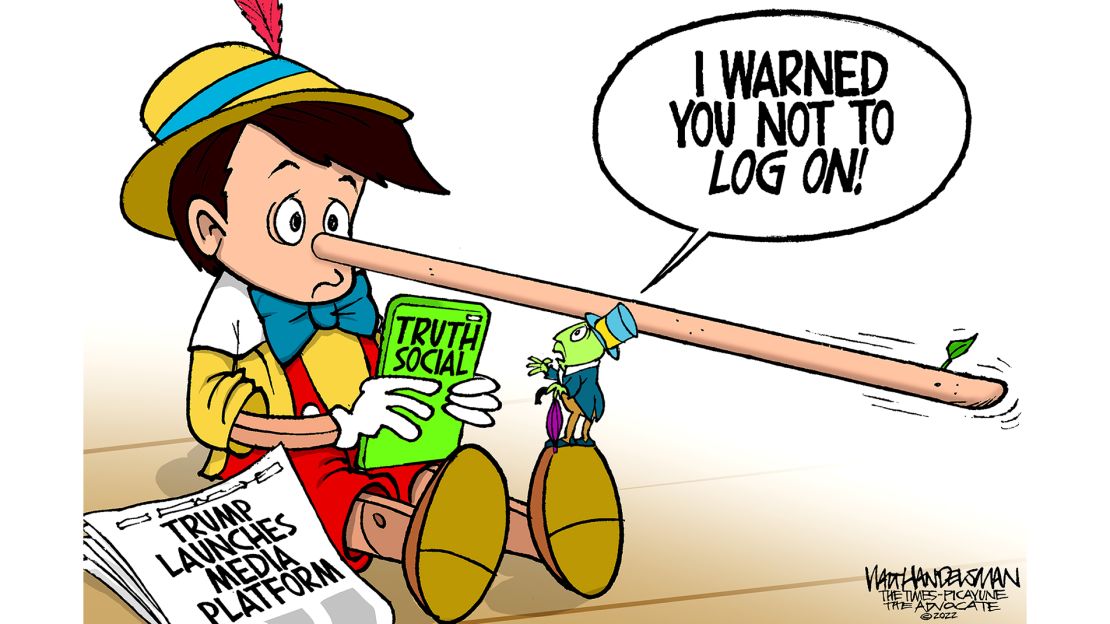
David Daley: Black voters are being written out of US democracy
Kara Alaimo: Why I’m scared about mask mandate rollbacks
Amy Bass: Women’s soccer settlement is a landmark win for fairness
Dean Obeidallah: ‘Hillary Clinton Derangement Syndrome’ is worse than ever
AND…
War on screen
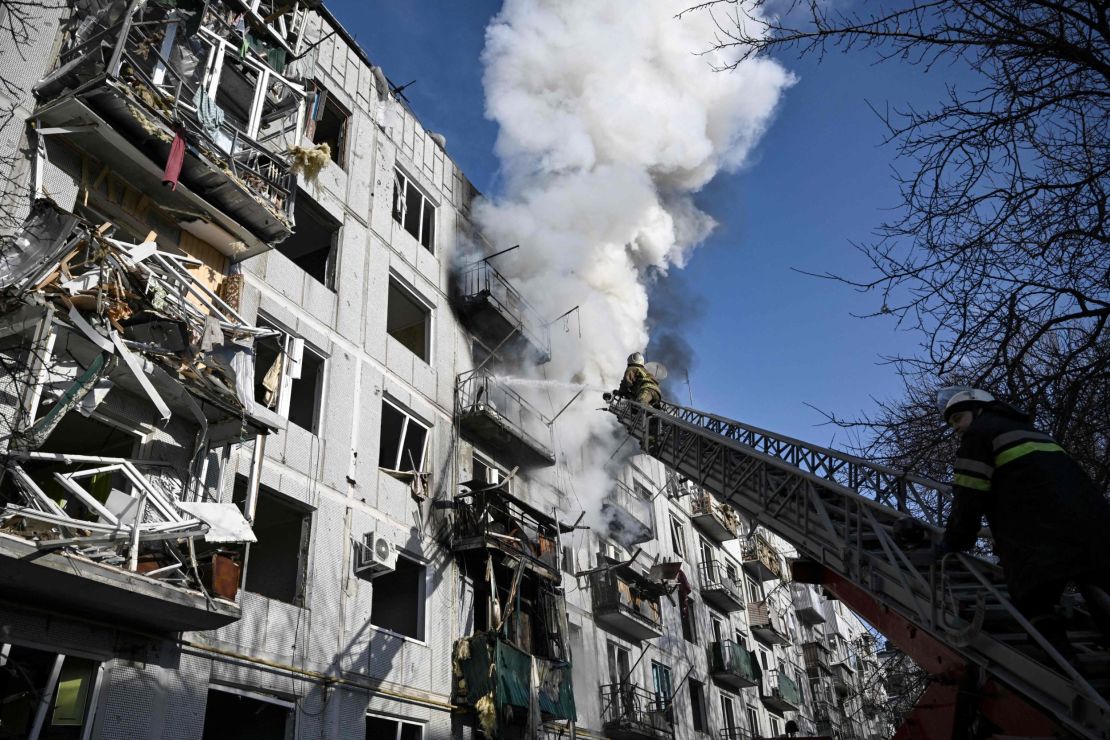
The disturbing images from Kyiv reminded Nicole Hemmer of a moment in her childhood. “We had only just gotten cable at our home in rural Indiana, and after school my brother and I would turn on CNN to see the sky over Baghdad filtered through night-vision lenses, bathed in a neon green color reminiscent of the glow sticks we liked to wave at the skating rink.” It was 1991, and the US was leading the international coalition responding to Saddam Hussein’s invasion of Kuwait.
“Soon our dinnertime conversations were peppered with talk of Scud missiles and General Norman Schwarzkopf (as German Americans, we quickly mastered his name) as we filled our parents in on the dramatic scenes we watched while they worked,” Hemmer wrote.
“My dad had little appetite for our reports. A reluctant Vietnam veteran, he had experienced the first televised US war as a combatant… but my dad’s experience was not the norm. For most Americans, war has been a spectator event, watched in crowded theaters and quiet living rooms. The invasion of Ukraine is no different. Even though the media have changed — the current war is unfolding not just on cable news but also on TikTok and Twitter feeds — the act is the same: most of us consume wars rather than experience them.”
Social media has made war omnipresent and eased the spread of misinformation, Hemmer noted. “As we watch this conflict unfold on screens, Americans must commit to developing our own ethics about war and fostering a deeper knowledge of this region’s geopolitics and its relationship to our own. Otherwise, the emotions raised by watching these images are breeding grounds for manipulation. And that’s why, as scenes from the war wash over us, we should ensure we’re not just consuming the war, but thinking deeply about what it means.”

